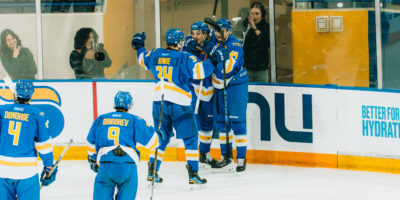By Julianna Cummins
News Editor
It’s a glamorous affair for a Wednesday evening in February. The hardwood-floored Bulthaup Showroom on Toronto’s King Street East is dimly lit, the glass walls showing the rest of the world the event underway inside.
Dr. Alan Fung, 44, a mechanical engineering professor at Ryerson University is dressed in formal attire that rivals the designer suits worn by those around him. Black hair combed back, dress shirt tucked in, glasses polished. But he is still without a tie.
Fung is bouncing around the room, speaking animatedly with people from the housing industry. He wants them to invest in his latest project: a house that will operate entirely on solar power and actually produce more energy than it needs.
“I would like to have all the buildings, not just in Canada, but all the world, have net-zero energy standards,” said Fung of his ultimate goal.
The North House, a life-sized model, will be built by a team of students from Ryerson, University of Waterloo and Simon Fraser University under the guidance of Fung and other faculty. It will then be entered in an international competition, the Solar Decathlon. Fung’s extensive research, expertise in renewable energy use in homes and relentless dedication to perfection has made Team North, as it’s called, a potential front-runner in the competition and is helping to make solar-energy homes a viable market option.
In his office in Eric Palin Hall, the sometimes absent-minded Fung forgot that he scheduled an interview.
“I have a midterm to supervise at 1:30,” Fung says, sneaking a glance at his watch.
Raised in Hong Kong, Fung came to Ontario as a teen, completing high school in southwestern Ontario. He attended Dalhousie University in Halifax, where he started his research into efficient energy systems.
In the final year of his mechanical engineering undergraduate degree, Fung completed an award-winning thesis project examining energy efficiency within a heating, ventilating and cooling (HVAC) system. While the project went well, Fung said he still felt clueless.
“I realized that I didn’t know much,” said Fung with a laugh.
His solution was to continue with school. He climbed up the ivory tower, completing a master’s degree and a PhD at Dalhousie in mechanical engineering, focusing on energy efficiency and earning a Governor General’s Gold Medal award for his masters thesis project. Fung then worked as a part-time research manager at Dalhousie, examining green energy technologies in homes – but he wanted to test his theories.
“I thought, why not use my own house to test it out,” said Fung. In 1996, Fung built a house in Halifax that incorporated technologies such as solar hot water heating, a high-efficiency heat recovery ventilator and argon-filled windows to reduce heat loss in the winter. Fund and his family lived in the house for almost ten years.
In 2005, Fung was offered a full-time position at Ryerson University. While he was reluctant to leave Halifax, he thought living in Toronto would be beneficial for his research.
“In Toronto, you have the biggest city in Canada, you have the most populated province in Canada and most of the industrial and commercial activity happens here,” said Fung.
Since Fung has been at Ryerson, he’s encouraged his graduate students to get involved in green energy pilot projects. The Sustainable Urbanism Initiative (SUI), a project headed by Fung and Ryerson, aims to design and build urban ‘net-zero energy’ homes in the Annex.
Net-zero energy means the houses will produce all of the energy on their own and not use the electrical grid. Energy for the SUI homes will be produced through solar panels and ground heat pumps. While this project has been put on hold due to the recession, many of the same technologies will be used in the North House.
The North House will use technologies Fung helped to develop, such as solar heating and waxy bead-shaped materials in the drywall that will absorb the energy of the sun and release it as heat at night.
The team secured land in Woodbridge to build a test model of the house, but still needs funds for materials and to get to the competition in Washington – hence the aforementioned swanky fundraising event.
Humphrey Tse is a Ryerson graduate student working on Team North. Tse said he enjoyes working with Fung, and that he expects excellence from his students. Tse said he didn’t have much of an option when it came to helping his supervising graduate professor on his projects.
“It wasn’t ‘If you want to help,’ it was ‘Help out, do this'” said Tse.
Derek Satnik from Mindscape Innovations, a consulting company specializing in implementing renewable energy technologies within homes, came to the fundraising event to see if his company could donate to the project. While Satnik is impressed, he questions the market viability of such homes.
“The general assumption is that these materials are still too expensivee,” said Satnik. “The projects are great, but the market value isn’t there yet.” All of Fung’s projects push towards making net-zero homes a market reality and Satnik’s comments prove what a struggle this may be.
But Fung is clearly not discouraged. He has spent the past hour speaking to a representative from Sears, constantly drawing imaginary diagrams with his hands. Someone asks him how the event is working out.
“I’m very pleased with the results,” he said, as he surveys the room, looking for another unattended industry rep.











Leave a Reply